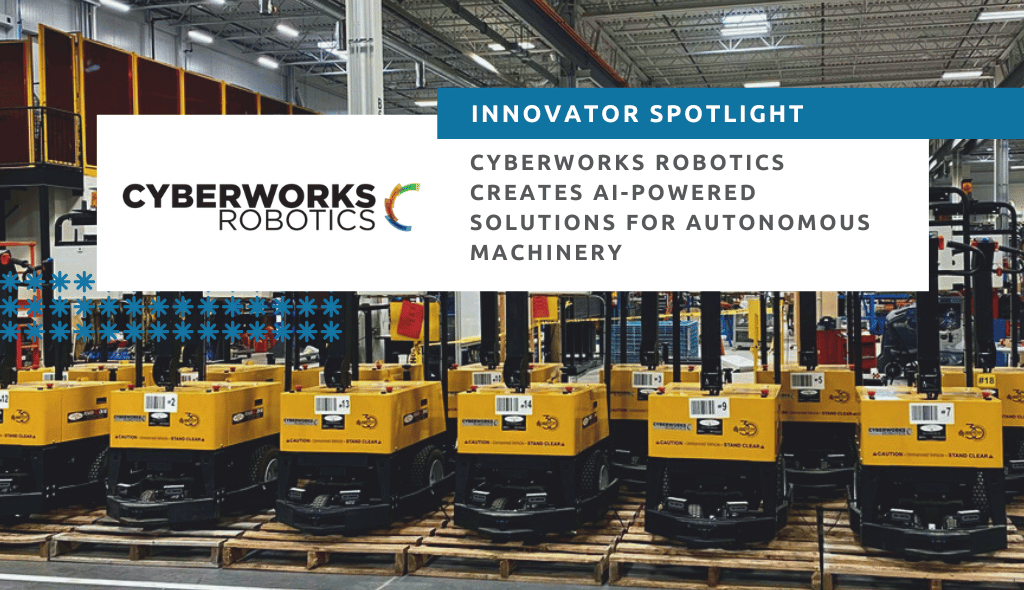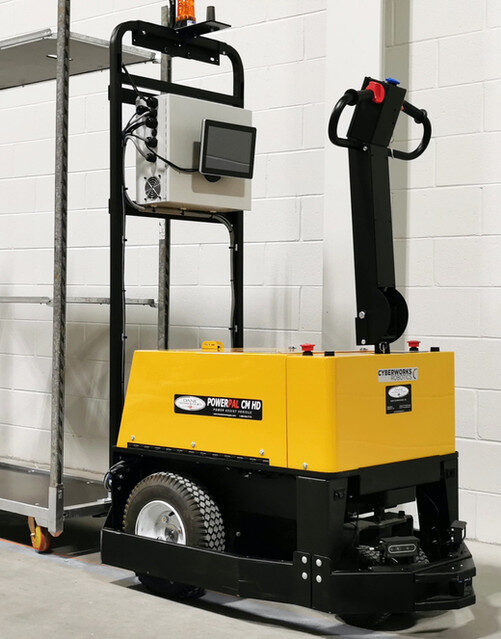Home » Advancing autonomous machinery with AI solutions
Advancing autonomous machinery with AI solutions

This article was originally published by Sarah Kelsey for ventureLAB, on March 20, 2023.
To say Vivek Burhanpurkar, the CEO of Cyberworks Robotics, knows what he’s doing when it comes to autonomous vehicles is a bit of an understatement. When he was at the University of Toronto, he wrote the world’s first thesis paper on the technology and how it could be used in indoor environments. He went on to start the first autonomous vehicle company back in 1984, and published some of the earliest peer-reviewed papers on self-driving technology. The only problem? He was a little too ahead of his time.
“Unfortunately, the computing and sensor costs were far too high to make a meaningful mass-market product,” Vivek tells ventureLAB. Fast forward a few decades when GPU prices began to plummet and things changed. “I thought it was an interesting time to jump back into my original field.”
That’s when Cyberworks Robotics was born.
With the use of Artificial Intelligence (AI), the company is able to adapt manually operated machinery and make it autonomous. Their technology has also solved one of the most pressing problems surrounding self-driving vehicles: how they adapt to their surroundings.
“Autonomous vehicles have historically relied on seeing key features in their environment to figure out where they’re going,” says Vivek.
He uses driving around Downtown Toronto as an example. “If you’re driving by the CN Tower and you see it on your left, it gives you an idea of where you are in the city. But if your line of sight to the CN Tower is blocked, you may get confused.”
This is what can happen to autonomous machinery and smart mobility vehicles.

Cyberworks Robotics Industrial tow tugs can follow taught routes to ensure consistent & efficient navigation, and run predictive self-diagnostics to avoid interruptions or errors.
“In all of the technologies that have existed, if you have a self-driving forklift and someone places a pile of boxes beside it such that it can no longer see a key navigation landmark, your autonomous forklift no longer knows where it’s going, which is a key issue and is why self-driving anything isn’t as commonplace as the media says it is,” he adds.
To resolve this issue, Cyberworks has created a navigation software (complete with safety failsafe systems and cloud-based fleet management) that allows vehicles equipped with their technology to use the natural features on the ceiling of a building to figure out where they should be going and when. In a sense, the technology creates virtual roadways in the sky so a vehicle always has a clear path to its destination.
Cyberworks can apply this technology (via sensors) to existing autonomous machinery or the technology can be built into a vehicle on the assembly line. The possibilities for its use are endless.
A real-time example can be seen at ventureLAB’s headquarters in Markham, a place Vivek visits frequently as part of this year’s Accelerate AI cohort. Cyberworks’ sensors were applied to the company’s floor cleaning machines. Now, the building gleams because of a fully autonomous vehicle.
Being able to see the technology at work – and getting exposure to the experts at ventureLAB – has been an invaluable experience, Vivek says, noting he’d recommend the organization to anyone looking to get into the high-tech startup space.
So what’s next for Cyberworks?
First, patenting their technology. (It’s in the works.) Then, Vivek says, he’d love to see the company become the “Microsoft of self-driving equipment.” With no real competitors in the space (especially competitors who have the ability to adapt vehicles using a modular kit), he says it’s possible.
Plus, he adds, he knows his technology is something the world needs.
“Automating mundane tasks has always been important… there’s never been any inhibition to automate tasks that are dirty, dangerous, or dreary… and there are a lot of those tasks, especially post-COVID, where there are labour shortages,” he says.
“Our work is helping to increase workplace safety, satisfaction, and efficiency, while also decreasing workplace attrition, and facilitating 24/7 workforce persistence at no additional cost to society. We believe in the ability of autonomous systems to liberate humans from menial labour and long hours and facilitate fairer distributions of wealth and greater social justice.”
Innovation Factory
Innovation Factory is a business accelerator, dedicated to helping Ontario-based businesses launch, scale, and succeed. Supporting the Brant, Halton, Hamilton and Norfolk regions, we provide start-ups, and scaling companies with advisory services, training, mentorship, and strategic connections to help bring disruptive technologies to market, leverage intellectual property, increase revenues, attract investment and create jobs. Innovation can happen anywhere, our goal is to make it work everywhere. We work to elevate key industry sectors including advanced manufacturing, clean tech, information technology, smart transportation, life sciences & health care and social innovations. We are passionate about driving the growth of Ontario businesses like yours. Whether you are an entrepreneur bringing new ideas to market or a scaling business trying to get to the next level, we want to help.

